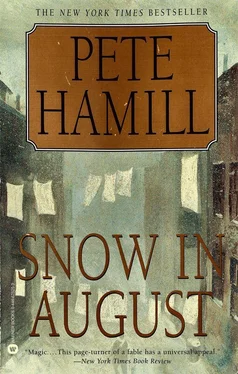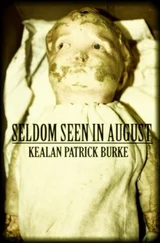“This is — the word is hype… heep-oh-crazy?”
“Hypocrisy. And Leo told the sportswriters about it — and they put it in the papers. But Happy Chandler didn’t suspend MacPhail for having the gamblers in his box. He suspended Durocher for talking about it!”
“Hyp o crisy!”
“And here’s the worst part, Rabbi. The reason behind it? I read it in the Daily News . The reason was that Larry MacPhail got Happy Chandler his job!”
“Corrupt!”
“A straight payoff!”
Oh, there were some other things too. Leo had married a divorced woman named Laraine Day. Last year, he was supposed to have beaten up a fan. But basically his detrimental conduct was in pointing out the truth. The result was that an old guy named Burt Shotton was managing the Dodgers in 1947. And Burt Shotton didn’t wear a uniform. He wore a suit and tie. When he left his last team, he swore he would never wear a baseball uniform again, and he didn’t. But he couldn’t go out on the field. And he was too old to kick the crap out of Ben Chapman.
“ Crap , what is this word?”
Michael was embarrassed but he explained what the word meant. The rabbi laughed.
“That would be good to see!”
Rabbi Hirsch was working hard at understanding baseball. On the table, there were sports pages marked with a red pen, and sheets of blank paper covered with names and numbers and Hebrew letters. He seemed to have chosen baseball as his key to understanding America. He had been listening to the games since the beginning of spring training, and even his language started to change. On some days, he almost sounded like Red Barber.
“Ho, boychik, you just missed some rhubarb,” he said one afternoon, slurring the word in a southern way. “But don’t worry. Higbe’s sitting in the catbird seat!”
The games, and Barber’s voice, made Rabbi Hirsch happy. But he also was disturbed by Robinson’s slump. He shook his head one afternoon, as they listened to the game and Robinson grounded out to the shortstop. He said that soon they would have to will Robinson into hitting. He and Michael, if nobody else. They must pray. They must chant. They must light candles. They must believe.
“Why can’t we use the Kabbalah?” Michael said. “There must be words there we can use.”
The rabbi gave Michael a cautious look.
“We only go to the Kabbalah,” he said, “if all else fails. That is not yet.”
But Rabbi Hirsch did understand how important it was for Robinson to succeed.
“For the colored people, is very important,” he said. “And for poor people, all kinds. And for us too, for the Jews.”
Michael waited for an explanation, and it came.
“A man like this, he is a, a… I don’t know the word. But he is there for others. Catholics, when they are hated, Jackie Robinson is a Catholic. Jews, when they are hated, Jackie Robinson is a Jew. You see?”
“Sort of.”
“So Jackie Robinson we have to help,” Rabbi Hirsch said. “We help him, we help ourselves.”
“I see.”
“You must talk to Father Heaney too.”
“I will.”
And he did. Father Heaney was very grave as Michael explained what Rabbi Hirsch had told him. He nodded his head and said he would offer up the seven o’clock mass the following morning for Jackie Robinson. That afternoon, Robinson went 0-for-3, with a base on balls. In bed that night, Michael whispered in Yiddish.
A gefalenem helft Got .
God helps the defeated. God helps the defeated. God helps the defeated.
And ended his prayers with ten Our Fathers and ten Hail Marys. He hoped the bad dreams would not come. He hoped he would dream of Robinson hitting a triple. And then stealing home. Against the Phillies.
Please God, help the defeated, he whispered. Let Jackie Robinson hit.
In the midst of Robinson’s awful slump, a rumor swept through the parish: Frankie McCarthy had copped a plea. The detectives had traced the cans of red Sapolin number 3 straight to Frankie and found a stiff paintbrush in the lot on Collins Street, six doors from Frankie’s house. The rumors said that a clerk from Pintchik’s paint store on Flatbush Avenue picked Frankie out of a lineup. “They even had fingerprints on the brush,” Sonny explained. “And on the can. This guy is dumb as a cucumber.” Frankie’s lawyer told him it was better to plead guilty to the charge of vandalism than face trial for assaulting Mister G.
“And get this,” Sonny said. “The lawyer was a Jew and the judge was a Jew!”
“They should’ve thrown him in the goddamned river,” Michael said.
“We’ll, he’da gone up the river on the assault charge,” Sonny said. “For a couple of years. Copping to the paint thing, he’s out in a couple a months.”
It didn’t seem right to Michael. Poor Mister G was in a bed somewhere with a broken head. His mind was gone. His store was gone. His wife must cry herself to sleep. His kids were trying to get him to read an old prayer book so they could talk to him before he died. Frankie was going to be all right, with a nice warm cell and all his meals. “Three hots and a cot,” Sonny called it. And because of other things Frankie had done, Rabbi Hirsch had trembled with bitterness and Michael’s mother had been driven to fury. In a few months, Frankie McCarthy would be back on the street. He’d sneer. He’d laugh. He’d hurt someone else. It wasn’t right.
The rumors turned out to be true. But when Michael brought the news to Rabbi Hirsch, the rabbi said nothing. He made a sound. Humf . That was all. Humf . The sound of a man who knew that for some crimes, nobody ever truly pays.
Rabbi Hirsch did not brood, at least not in front of Michael. He was too busy mastering the theory and practice of baseball. Alone in the synagogue, he wrote pages of notes and consulted them while firing questions at Michael.
A bunt is what?
How is explained a southpaw?
This Red Barber, he’s a socialist?
What means picked off?
Harold Reese, why is called Pee Wee?
A double play, this is two runs?
Mr. Shotton, his name is Boit or Burt?
Who is an Old Goldie?
None of this was easy. Michael had tried to teach baseball to his mother and had failed. After fifteen years in America, she still didn’t know first base from third. But Rabbi Hirsch went at the task with Talmudic intensity. After hearing Michael’s explanations, he copied the language of baseball from loose sheets of paper into a kid’s composition book. He made diagrams. He insisted on knowing the rules. Much of this was abstract. The daily newspapers never showed photographs of the whole ballpark, but Michael had a drawing of Ebbets Field that he’d cut out of an old copy of the Sporting News and he used it to explain the positions and the bases. When they talked baseball, the sadness left the rabbi’s eyes. They never talked about Frankie McCarthy. And for a few days they stopped talking about Jackie Robinson too. What needed to be said had been said. The prayers had been offered. God knew what He should do. But it was too soon to use the Kabbalah.
And then Robinson began to hit.
And then Robinson began to dance off second base, driving pitchers crazy, drawing throws from angry catchers, coming in a rush around third, with Red Barber’s voice rising, saying, And here comes Robinson .
Robinson began to hit, and the Dodgers began to win. And in the synagogue on Kelly Street, Rabbi Hirsch was clipping stories too, from the Brooklyn Eagle and from the Forvertz . Michael brought his scrapbook to show Rabbi Hirsch, and the rabbi got one for himself.
Читать дальше












